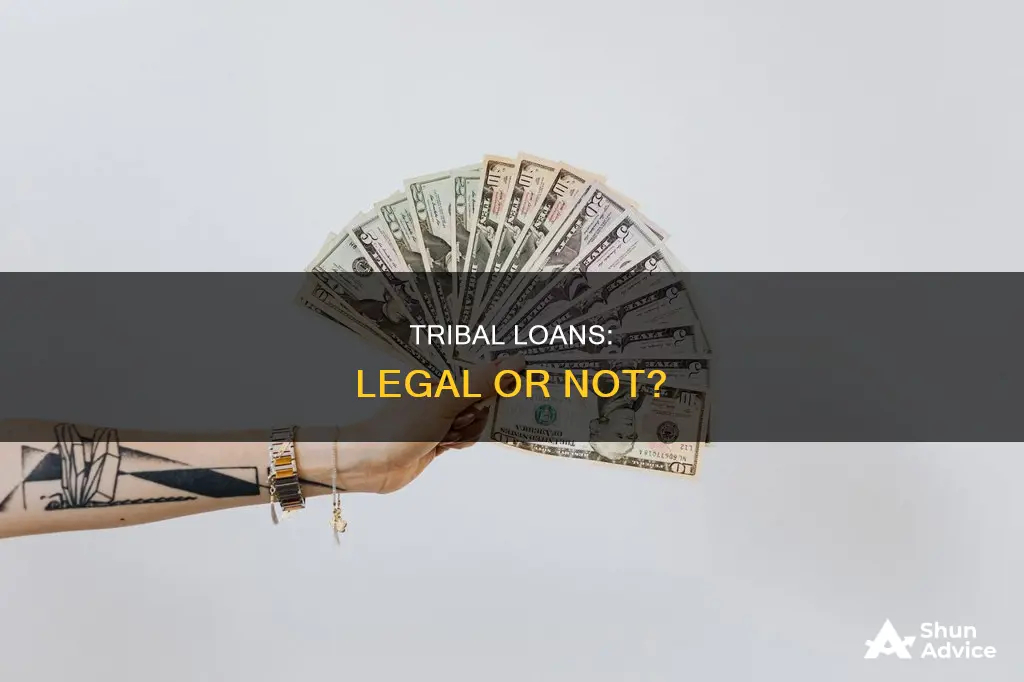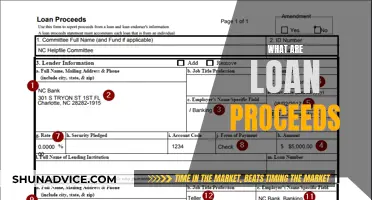
Tribal loans are a type of payday loan offered by Native American tribal lenders, who frequently claim that they are not subject to state lending laws and are thus able to charge extremely high interest rates. The legality of tribal loans is a complex issue, as it involves the sovereignty and immunity of tribal nations, as well as state and federal laws. While tribal lenders are not exempt from federal law, they often operate on tribal land, where state law does not apply, and where they can charge interest rates that far exceed state-level caps.
| Characteristics | Values |
|---|---|
| Tribal land | State law does not apply to loans taken on tribal land |
| Sovereign immunity | Tribes have a degree of sovereignty and immunity but are still subject to US federal law |
| Tribal lenders | Claim they do not have to comply with state lending laws; do not get the necessary licenses to provide consumer loans |
| Interest rates | Often 250% or higher; some states have laws capping interest rates |
| Legality | Complicated; depends on specific circumstances and location |
| Regulation | Minimal due to sovereign immunity; Consumer Financial Protection Bureau (CFPB) provides some regulation |
| Tribal courts | A tribal lender cannot use a US state court to enforce a lawsuit |
| Debt collection | Tribal lenders do not have the legal authority to garnish wages without a court order |
| Tribal lending industry | Has been subject to criminal charges, including wire fraud and racketeering |
What You'll Learn

Tribal loans are subject to US federal law
Tribal loans are a type of payday loan offered by lenders operating on Native American tribal land. These lenders claim they are exempt from state lending laws and do not need to obtain the necessary licenses to provide consumer loans. As a result, tribal loans often come with extremely high interest rates, with some lenders charging between 250% and 500% interest, and in some cases, even exceeding 600%.
While tribal lenders argue that they have sovereign immunity and are not subject to state lending laws, it is important to note that they are still subject to US federal law. This means that despite their claims of sovereign immunity, tribal lenders can be held accountable for unlawful practices under federal law.
For example, in 2016, a federal grand jury indicted Scott Tucker, a tribal lender, on charges of collecting unlawful debts and failing to disclose loan terms. Tucker was convicted and sentenced to a significant prison term, demonstrating that federal laws and regulations can be enforced against tribal lenders engaging in illegal activities.
Additionally, the Federal Trade Commission (FTC) has taken action against tribal lenders in the past. In 2014, the FTC reached a settlement with Western Sky Financial and other tribal payday loan companies that were attempting to garnish wages without a court order. The FTC asserted that tribal lenders do not have the legal authority to garnish wages without a court order, highlighting another instance where federal law supersedes tribal lender practices.
However, it is worth mentioning that the absence of a federal usury law and the varying state usury laws contribute to the complexity of the legal landscape surrounding tribal loans. While tribal lenders may be subject to federal law, the specific regulations and enforcement actions applicable to them can be intricate and subject to differing interpretations.
Understanding NAV Loans: What Investors Need to Know
You may want to see also

Tribal lenders claim they don't have to comply with state lending laws
Native American tribal lenders frequently claim that they are exempt from state lending laws, arguing that their sovereignty grants them immunity from such laws. This assertion is based on the premise that tribes are considered sovereign nations, subject only to the federal government and not individual state laws. Consequently, tribal lenders often forgo obtaining the necessary licenses required for providing consumer loans. These loans typically carry interest rates ranging from 250% to over 500%, significantly higher than what is permitted by state usury laws.
The claim of sovereignty has allowed tribal lenders to offer loans with terms that no other lender can provide. This has attracted consumers who are desperate for funds and willing to accept these exorbitant terms. However, the legal landscape surrounding tribal lending is complex. While tribal lenders may assert sovereignty, they are still required to adhere to federal lending laws. Additionally, the applicability of state law depends on the location where the loan was taken out; if the loan was obtained on tribal land, state law generally does not apply, but if it was taken out online or off tribal land, state law may come into play.
The lack of compliance with state lending laws has led to a wave of lawsuits and consumer complaints against tribal lenders. Several states, including Connecticut, Arkansas, New York, Pennsylvania, Virginia, and West Virginia, have actively worked to eliminate tribal loans within their borders. These efforts have been driven by aggressive attorneys and strong consumer protection laws in these states. Private attorneys have also played a significant role in challenging the tribal lending industry through consumer lawsuits and class-action claims, resulting in substantial settlements for borrowers.
Despite the legal challenges, the tribal lending industry has proven resilient, adapting to continue offering high-interest loans to financially vulnerable consumers. This resilience is partly attributed to the protection provided by lobbyists and politicians, allowing the industry to generate substantial profits. However, there have been some notable legal victories against tribal lenders, such as the $8.7 million restitution and $100 million debt relief secured in a settlement with Big Picture Loans LLC, owned by Michigan's Lac Vieux Desert Band of Lake Superior Chippewa Indians.
Defaulting on Loans: Understanding the Dire Consequences
You may want to see also

Tribal loans are often made without the necessary licenses
Tribal loans are a form of payday loan based on Native American tribal land. Native American tribal lenders frequently claim that they do not have to comply with state lending laws and, therefore, do not obtain the necessary licenses to provide consumer loans. This is because they argue that the US Constitution grants them sovereign immunity, or the right to govern themselves.
However, while tribes do have a degree of sovereignty and immunity, they are still subject to US federal law. A US Supreme Court ruling provided some clarity on this issue, stating that Native American tribal businesses do not have tribal immunity in bankruptcy proceedings. This means that the tribe's debts are still dischargeable.
Despite this, tribal lenders have been able to get away with charging triple-digit interest rates. For example, in Colorado, the maximum interest rate for loans is limited to 45% per year, often referred to as the usury rate. However, some tribal lenders have charged interest rates of 699%, which would be considered usurious under Colorado law.
In another case, a Virginia law firm filed a class-action lawsuit against the council members of a Native American tribe and their lending company, challenging the legality of the loans given Virginia's policies capping interest rates. The company settled for $8.7 million in restitution for customers and $100 million in debt relief.
Tribal loans are often made with extremely high interest rates, with APRs between 440% and 1,000% for their installment loans. This means that many borrowers end up paying tribal loan companies far more than they initially borrowed.
Grants vs Loans: Understanding the Key Differences
You may want to see also

Tribal loans can have interest rates of over 500%
Tribal loans are a type of financial product that is offered by Native American tribal lending entities. These loans have often been associated with extremely high interest rates, with some exceeding 500%. While the high interest rates may seem exploitative, tribal loans are often legal due to the unique legal status of Native American tribes.
The key factor that sets tribal loans apart from traditional loans is the involvement of Native American tribes. These tribes are sovereign nations, which means they have their own laws and legal systems. When a tribal lending entity offers a loan, it is governed by the laws and regulations of the tribe, not the state where the borrower resides. This is why tribal loans can often bypass state-imposed interest rate caps and other regulations that traditional lenders must abide by.
The high interest rates associated with tribal loans can be attributed to the nature of the lending entities and the risks they take on. Tribal lending entities are often small operations with limited resources. They may have higher operating costs compared to traditional lenders, and they also take on the risk of lending to borrowers who may have poor credit histories or limited access to other forms of credit.
While the high interest rates may be legal due to tribal sovereignty, it is important for borrowers to carefully consider the potential costs and risks associated with these loans. Tribal loans often have short repayment terms, and the high interest rates can quickly lead to a cycle of debt if the loan is not repaid on time. Borrowers should thoroughly review the terms and conditions of any loan offer, including the interest rate, fees, and repayment schedule, before agreeing to a tribal loan or any other type of financial product.
Understanding the Basics of Swingline Loans
You may want to see also

Tribal loans are repaid in instalments, often bi-weekly
The legality of tribal loans is a complex issue. Tribal lenders frequently claim that they do not have to comply with state lending laws and that they are only subject to federal law as they are considered sovereign nations. This means that state law does not apply if the loan was taken on tribal land. However, if the loan was taken online or off tribal land, state law generally does apply.
Tribal loans are often associated with high fees and interest rates, sometimes exceeding 500%. These loans are typically repaid in instalments, often bi-weekly, which allows borrowers to avoid repaying the entire loan balance in one lump sum. However, this also means that interest will compound, and given the extremely high interest rates, it will compound very quickly. For example, many borrowers have reported paying tribal loan companies more than $3,000 to repay an $800 loan. The annual percentage rates (APRs) for tribal loans can range from 440% to 1,000% or even higher.
While tribal lenders argue that they are exempt from state lending laws due to sovereign immunity, there have been legal challenges to the legality of these loans. For instance, a class-action lawsuit was filed in 2017 against a tribe and its lending company, challenging the legality of the loans given Virginia's policies capping interest rates. This resulted in a settlement of $8.7 million in restitution and $100 million in debt relief.
Additionally, the Federal Trade Commission (FTC) reached a settlement with Western Sky Financial and other tribal payday loan companies in 2014, asserting that tribal lenders cannot garnish wages without a court order. It's important to note that the federal government does not offer specific programs to help borrowers repay tribal loans, and sovereign immunity limits regulation efforts.
Overall, while tribal loans may offer flexibility in repayment through instalments, borrowers should be aware of the potential risks and high costs associated with these loans due to the complex legal landscape and high interest rates involved.
Avant Loan Approval: What's the Process?
You may want to see also
Frequently asked questions
Tribal loans are a legal grey area. Native American tribes claim sovereignty from state lending laws, and so can offer loans with interest rates that would be illegal under state law. However, they are still subject to US federal law, and some have been charged with fraud and collecting unlawful debts.
No, a tribal lender cannot garnish your wages without a court order. If they try to do so, contact an attorney immediately.
If the loan was taken on tribal land, state law does not apply, and the tribe is its own sovereign nation subject only to the federal government. They could sue you in a tribal court, but this has no enforcement power over you as a non-member.
Tribal loans are not regulated by state law, and the federal government does not offer much help for borrowers stuck with a tribal loan that exceeds state interest rate caps.
Tribal loans are potentially even more dangerous than traditional payday loans. They are far more expensive, with APRs between 440% and 1,000%.







